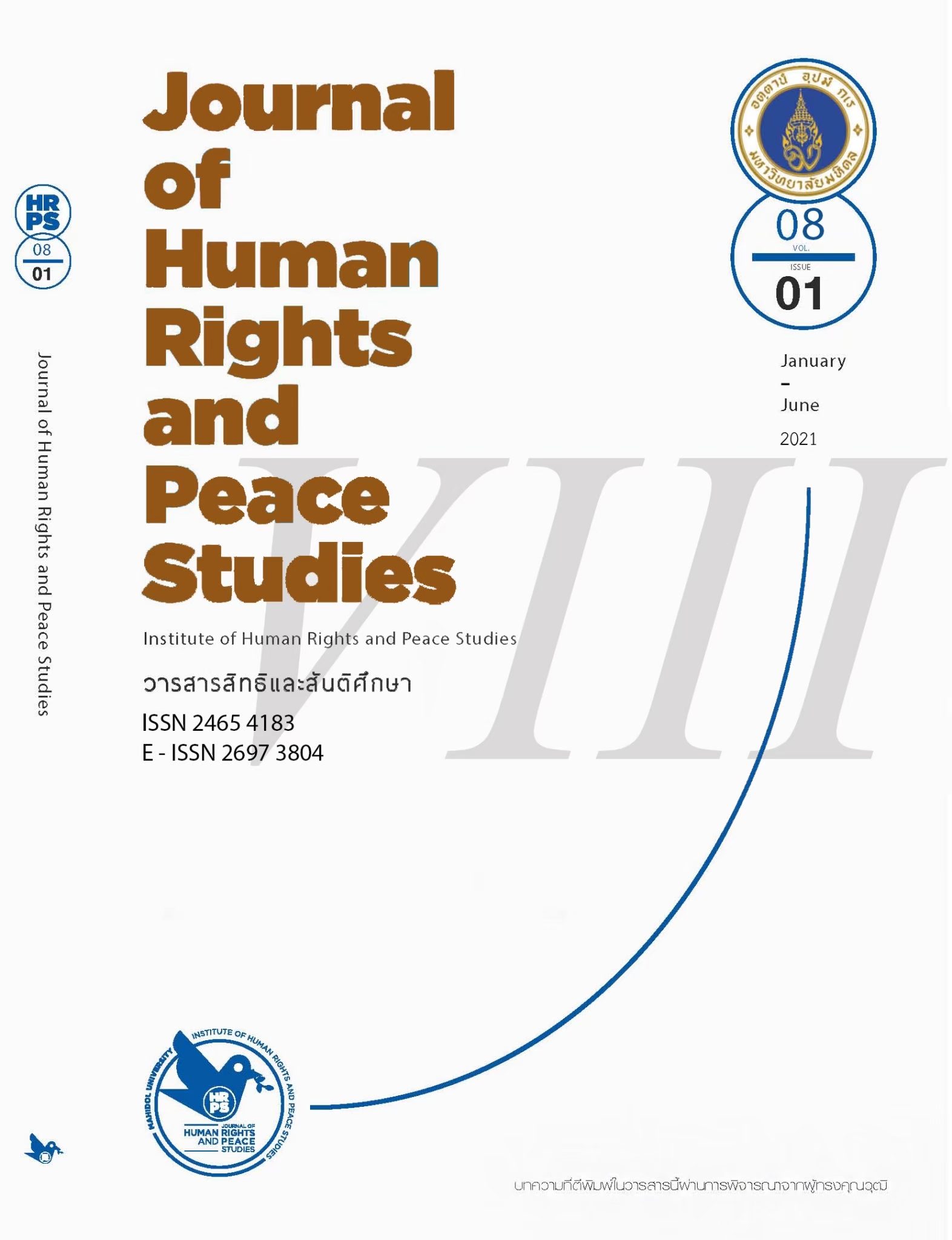The Mouth Covering Named Rape Culture and a Struggle for Gender Justice on Social Media
Main Article Content
Abstract
Rape culture serves as the mouth covering to silence women’s voices. In particular, women who experienced Gender-Based Violence and became a campaigner to end violence. This study interviewed seven women who revealed themselves and their experiences on social media and later became advocates to fight against sexual violence between 2016 and 2019, the year of the #MeToo phenomenon that emerged in 2017. This article examines the impact of rape culture on this group of women. The findings reveal that sexual violence is rooted in a culture of violence that always has an adversarial and intense impact on women since they were sexual victims and even when they become advocates. Gender-Based Violence is perceived as a personal issue and ignored when the victims pursue help and support. The public’s adherence to gender norms and the sexuality of women and men leads to the victim’s reprimand and the perpetrator’s legitimacy. Acceptance of violence partly supported by gender norms stemmed from the discourse of Thainess. Some victims were confused and accepted sexual violence due to their relationship with the perpetrators. The findings echo the myth about victims and sexual criminals in society. Public opinions challenge to diminish, marginalize women’s voices, and halt the campaign in politicizing women’s experiences - “the personal is political.” This article attempts to give readers a clearer view of the faces of rape culture and to provide some observations to dismantle the rape culture.
Article Details

This work is licensed under a Creative Commons Attribution-NonCommercial-NoDerivatives 4.0 International License.
The views, opinions, and pictures expressed in this journal are those of the authors and do not necessarily reflect the opinions and viewpoints of the editor and the editorial board. All rights are reserved by the authors and the Institute of Human Rights and Peace Studies of Mahidol University. No part of this journal may be reproduced, stored in a retrieval system, or transmitted in any form or by any means without the prior permission in writing from the journal’s editor, or as expressly permitted by law, or under terms agreed with the appropriate reprographics rights organization. Non-commercial use of information in this journal must be properly referenced.
References
Archavanitkul, K. & Co-organization (2009). Kānthamngān khō̜ng khrư̄akhāi sū khō̜sanœ̄ chœ̄ng nayōbāi suk phāwa thāng phēt sām dān. In K. Archavanitkul (Ed.), Thưng wēlā . . tō̜ng khaočhai læ kǣkhai . . . khwāmrunrǣng thāng phēt ʻĒt læ thō̜ng mai phrō̜m. Institute for Population and Social Research, Mahidol University. (In Thai).
Armstrong, E. A., Gleckman-Krut, M., & Johnson, L. (2018). Silence, power, and inequality: An intersectional approach to sexual violence. Annual Review of Sociology, 44, 99–122. https://doi.org/10.1146/annurev-soc-073117-041410
Bangkok Declaration. (1967). Final declaration of the regional meeting for asia of the world conference on human rights. https://www.hurights.or.jp/archives/other_documents/section1/1993/04/final-declaration-of-the-regional-meeting-for-asia-of-the-world-conference-on-human-rights.html
Brownmiller, S. (1975). Against our will: Men, women and rape. Ballantine.
Boonchu, F., & Mumbanchao, J. (2019). Krasǣ Me Too nai prathēt Thai kap kān khukkhām thāng phēt [Me Too flow in Thailand with sexual harassment]. Journal of Humanities and Social Sciences, Suan Sunandha Rajabhat University, 2(1), 110-118. http://journal.ssru.ac.th/index.php/hsssru/article/view/582/401. (In Thai).
Buchanan, F., & Jamieson, L. (2016). Rape and sexual assault: Using an intersectional feminist lens. In S. Wendt, & N. Moulding (Eds.), Contemporary feminisms in social work practice (pp. 220–237). Routledge.
Budgeon, S. (2001). Emergent feminist(?) identities: Young women and the practice of micropolitics. European Journal of Women's Studies, 8(1), 7–28. https://doi.org/10.1177/135050680100800102
Changkhwanyuen, P. (1991). Khwāmkhit thāngkān mư̄ang nai phra traipidok. Chulalongkorn University (In Thai).
Chittal, N. (2015, March 27). How social media is changing the feminist movement. MSNBC. http://www.msnbc.com/msnbc/how-social-media-changing-the-feminist-movement
Eigenberg, H., & Garland, T. (2008). Victim blaming. In L. J. Moriarty (Ed.), Controversies in Victimology (pp. 21–36). LexisNexis Anderson.
European Commission. (n.d.). Gender-based violence (GBV) by definition. https://ec.europa.eu/info/policies/justice-and-fundamental-rights/gender-equality/gender-based-violence/what-gender-based-violence_en
Galtung, J. (2004). Kān plīan khapkhlư̄an khwāmkhatyǣng dūai santiwithī. [Transcend and transform : An introduction to conflict work]. Kobfai Pringing (In Thai).
Khuankaew, O. (2009). Rethinging karma, the dharma of social justice. Silkworm books.
Khuankaew, O. (2015). Sēnthāng sū kān plīanplǣng phēt læ khwāmpen thammabot thān čhit winyān læ kānrīanrū dūai hūačhai. Women’s Wellbeing and Gender Justice Program (In Thai).
Panya, T. (2017a, August 18). Picture 1. Facebook. https://www.facebook.com/photo.php? fbid=1425179090863202&set=pb.100001133735211.-2207520000..&type=3&theater. (In Thai).
Panya, T. (2017b, August 27). Picture 2. Facebook. https://www.facebook.com/thararat.panya/posts/1433334720047639 (In Thai).
Posita, C. (2007). Sāt læ sin hǣng kānwičhai chœ̄ng khunnaphāp. Amarin Printing (In Thai).
Skinnider, M. & Garrett, S. (2017). Kānphičhāranā khadī khwāmkhaočhai rư̄ang kāntō̜psanō̜ng khō̜ng krabūankān yuttham thāng ʻāyā tō̜ khwāmrunrǣng thāng phēt nai prathēt Thai læ prathēt Wīatnām. Thailand Institute of Justice (TIJ) (in Thai).
Southern Connecticut State University. (n.d.). Rape culture, victim blaming, and the facts. https://www.southernct.edu/sexual-misconduct/facts
Stubbs-Richardson, M., Rader, N., & Cosby, A. (2018). Tweeting rape culture: Examining portrayals of victim blaming in discussions of sexual assault cases on Twitter. Feminism & Psychology, 28(1), 90-108. https://doi.org/10.1177/0959353517715874
Thaipost. (2020, January 14). Khon run mai čhai sām ! ' lūkkǣo nōprā ' chœ̄n chūan dœ̄n len sabāi sabāi phrō̜m kap ...k Prayuth pai dūai kan si kha. https://www.thaipost.net/main/detail/54490. (In Thai).
UN Woman. (2011, February 25). Survivor-centred approach. http://www.endvawnow.org/en/articles/652-survivor-centred-approach.html
World Health Organization. (2021). Violence against women. https://www.who.int/news-room/fact-sheets/detail/violence-against-women
Women and Men Progressive Movement Foundation. (2017). Phœ̄i phon samrūat phop phūying nai กทม. - parimonthon kwā sāmsiphok kō̜ kā thūk khukkhām thāng phēt bon rot sāthārana. http://www.wmp.or.th/contents/view/154#.Weg-0WiCw2w (In Thai).
Women and Men Progressive Movement Foundation. (2020, June 15). Chut māyā khati phit phit thī sangkhom chư̄a læ tī trā rư̄ang " khomkhư̄n" [Image attached]. Facebook. https://www.facebook.com/wmpsocial/photos/a.856048954523498/2872244642903909/?type=3 (In Thai).


